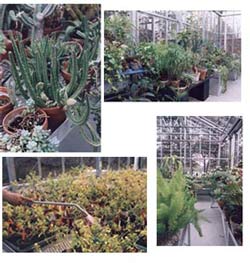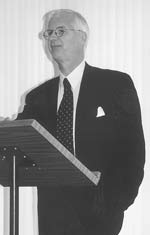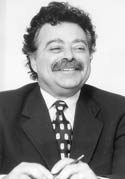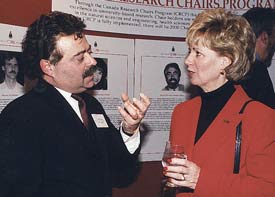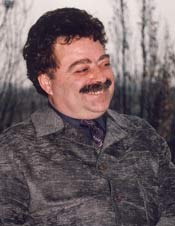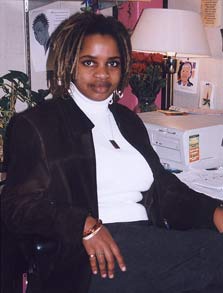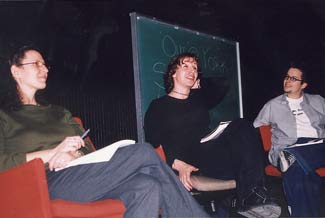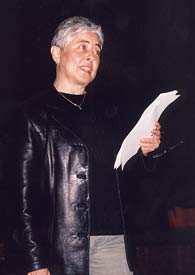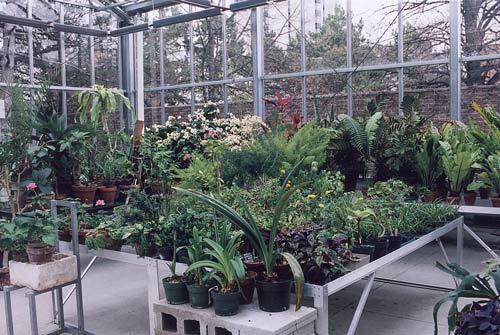|
|||||||||||||||||||||||||||||
|
|
|||||||||||||||||||||||||||||
| | |
| | VOLUME 32, NUMBER 18 | WEDNESDAY, MAY 22, 2002 | ISSN 1199-5246 | |
| | |||||||||||||
|
 |
Chinese interested in cultural training program 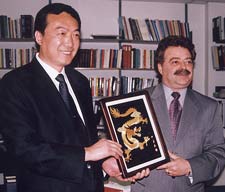
Chen Guanguo, vice-governor of Henan Province in China, presents a gift to Stan Shapson, vice-president research & innovation, who hosted a reception for Henan Province senior officials during a visit to York University April 19. Professor Bernard Frolic invited Chen and his delegation to visit York to discuss participating in York's Chinese Officials Training Program. The Joint Centre for Asia Pacific Studies began offering four-month programs last year in Western culture that included courses in management principles, public administration and English language and visits to meet city, provincial and federal officials in Toronto and Ottawa. Thirty-one Beijing officials are currently enrolled in the program and 20 from Shanghai are expected in September. Frolic is travelling to China this summer to promote the program, which has elicited much interest already, said Frolic.
| ||||||||||||
|
 |
Convocation Schedule Spring 2002
Ceremony #1 - Glendon College
Saturday, June 8, 2002 @ 2:30pm
Ceremony #2 - Faculty of Fine Arts and Faculty of Graduate Studies
Monday, June 10, 2002 @ 2:30pm
Ceremony #3 - Faculty of Arts I
Tuesday, June 11, 2002 @ 2:30pm
Ceremony #4 - Faculty of Arts II
Tuesday, June 11, 2002 @ 7pm
Ceremony #5 - Faculty of Arts III
Thursday, June 13, 2002 @ 2:30pm
Ceremony #6 - Faculty of Arts IV
Thursday, June 13, 2002 @ 7pm
Ceremony #7 - Schulich School of Business
Friday, June 14, 2002 @ 10am
Ceremony #8 - Osgoode Hall Law School
Friday, June 14, 2002 @ 2:30pm
Ceremony #9 - Atkinson Faculty of Liberal and Professional Studies
Saturday, June 15, 2002 @ 10:30am
Ceremony #10 - Faculty of Arts V
Monday, June 17, 2002 @ 10am
Ceremony #11 - Faculty of Environmental Studies & Faculty of Pure and Applied Science
Monday, June 17, 2002 @ 2:30pm
Ceremony #12 - Faculty of Education I
Tuesday, June 18, 2002 @ 10am
Ceremony #13 - Faculty of Education II
Tuesday, June 18, 2002 @ 2:30pm
For additional and robing information, see the Convocation Web site at www.studentaffairs.yorku.ca/convo/index.htm
| ||||||||||||
|
|
Some Like It Hot: York's new greenhouse climate is research friendly By Michael Todd 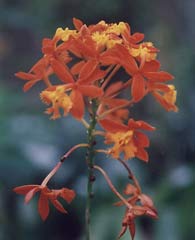
Who needs Club Med when you've got York's new Greenhouse? The day official greenhouse keeper Glen Marlok showed me around, the "hot" room (one of four distinct climate zones the new Greenhouse offers) was a balmy 30°C with a pleasant humidity level. Flowers were blooming (someone's experiment) and the sun was streaming in. If things get too steamy one can always retreat to the Greenhouse's basement (the 30-year-old structure didn't have such facilities) to a large insulated room that houses specialized, individual growing chambers (think of large self-contained freezer-like boxes) for experiments where plants need to be isolated from outside influences such as when starting seeds or seedlings. "This building's been on our wish list for 12 years," says Roger Lew, biology professor. "And thanks for herculean efforts of our former dean and people like Peter Struk, we finally got there." The new building has many high-tech bells and whistles and energy efficient features. It has its own mini weather station, for instance, which feed into things like the computer controlled cooling and heating systems, roof vents and reflective screens. Lew says the environmentally friendly ethylglycol cooling system is self-contained. "It doesn't bother the environment."
Greenhouses are very different from people's houses, says Lew. "That's why we went to smart technology for the project. There's tempered glass to minimize heat loss. It's a very controlled environment for plants. We've even considered chemical contamination of experiments by possible outside sources such as pesticide sprays. That's happened before with disastrous results. So now the Greenhouse and the basement growth chambers are completely sealed off using an air pressure system." Lew says the presence of growth chambers and four different climate zones has increased the flexibility for research tremendously. "We keep plants here for teaching purposes and also for research," says Lew. "The tripling or quadrupling of space and the technological advances over the old Greenhouse really has opened up unanticipated possibilities for biological research. We've gone from two growth zones in the old building to four. So that in itself is a huge leap." One interesting aspect of the new building is the soon-to-be-installed lighting confiscated by Peel Regional Police in various drug busts of illegal hydroponic operations. York got the lighting free under a Federal seized property program. "We like to call it our 'druggie lighting'," notes Lew. Club Fed anyone?
| ||||||||||||
|
|
Board of Governors-Synopsis At its 373rd meeting held on Monday, April 29, 2002, the Board of Governors of York University: * moved a motion of sincere congratulations to President Emeritus Harry W. Arthurs on the occasion of his being awarded the new Killam Prize for lifetime achievement in the social sciences; * received a presentation on the Faculty of Education from Dean Paul Axelrod; * received news that on the recommendation of the president, the Executive Committee had approved the reappointment if Dezsö Horváth as Dean of the Schulich School of Business for another five-year term; * approved, on the recommendation of the president and the Executive Committee, the appointment of Professor George Fallis to a three-year term on the Pension Fund Board of Trustees; * approved, on the recommendation of the Audit Committee the Policy on Occupational Health and Safety and the Annual Report on Occupational Health and Safety; * approved, on the recommendation of the Academic Resources Committee, the president's recommendations on academic appointments, tenure, and promotions; * approved, on the recommendation of the Executive Committee the creation of a new standing committee of the board to be known as the Land Use Committee; the consequent change of name of the Finance, Property and Staff Resources Committee to the Finance and Staff Resources Committee, with amended terms of reference and mandate; and a change in the terms of reference and mandate of the University Advancement Committee; * approved, on the recommendation of the Finance, Property and Staff Resources Committee: the proposed Budget Plan for 2002-2003 to 2004-2005; a revised budget for the new Schulich Building and the Executive Learning Centre; the tuition fee (excluding centrally collected ancillary and student referenda fees) at $12,000 for domestic students entering the LLB program commencing September, 2003; entering into an agreement with Solar Turbines Canada Ltd. for the supply and installation of a Taurus 60 cogeneration plant; a Four-Year Parking Rate Plan, dated Feb. 8, 2002; * resolved to move into an in camera session, and approved a waiver of the Procedures for the Re- appointment of a Chair included in the "Procedure Governing the Appointment and Re-appointment of a Chair of the Board of Governors" and the extension of the term of appointment of Marshall Cohen as Chair of the Board of Governors for a further one year to June 30, 2004; * received information reports from the Executive; Finance, Property and Staff Resources; Academic Resources; and Audit committees.
Harriet Lewis, Secretary
| ||||||||||||
|
|
Africa to be major topic at G8 Summit; Ambassador elaborates
Robert Fowler
One of the summit's three broad themes centres on Africa. "But why has the G8 'discovered' Africa after such a long time?" asked Fowler. "Because African leaders have produced NEPAD, a truly different type of plan for the continent."
NEPAD (New Partnership for Africa's Development) is an African initiative which was endorsed by G8 leaders at the 2001 Genoa Summit. The document is the basis for the G8 Africa Action Plan which will be adopted at the summit.
The G8 countries are pinning their hopes on NEPAD to instigate changes in Africa, said Fowler, especially as past efforts to help have failed. "People have said to us, 'Show me the country in Africa that is better off than when we started giving aid.' That is hard to do. Africa needs to see some successes. We need to see some successes."
NEPAD starts out with a new premise. "The document says that no foreseeable amount of ODA (Overseas Development Assistance) is going to fix Africa, and, further, that the only way to put Africa on the path of significant growth will be to attract investment. And it notes that to attract investment things must change in Africa."
Fowler said the document also criticizes the donor community "for a 40-year-old process of official development...that became complex and burdensome in the extreme. And it urges us to fix that." It also deals "forthrightly" with post-colonial corruption within some of its own governments, "so it really takes a fresh approach to the challenges of modern-day Africa."
The G8 Summit leaders will be examining several important areas within the Africa Action Plan: peace and security; governance; health and knowledge; trade and investment; and agriculture and water. One in five Africans are caught up in conflict, said the ambassador, and peace and security cannot be ignored.
"A modicum of good governance (political, administrative, financial, judicial) is needed if there is to be effective development." And with 70 per cent of new AIDS cases appearing in Africa, leaders must pay attention to improving health care in their country, he added.
NEPAD also calls for the easing of restrictions to developed markets. "Here, 59 per cent of exports from the world's 48 least-developed countries (36 of which are in Africa) encounter tariffs or quotas. That must be changed. We must at least assure the people there that if they make things we will buy them. Right now, Africa accounts for 12 per cent of the world population and only 1.6 per cent of world trade. That, too, must change."
Fowler also said that one in two people in Africa have no access to clean water. "When I first went there (as a young man) Africa was going to be the 'breadbasket of the world'. At the moment it can't feed itself."
G8 countries applaud NEPAD's recommendation for a peer review process in Africa. "Drawing on that we are going to focus our development attention - not our humanitarian aid attention - on those few countries that, with some significant help, could put good governance elements in place that will attract investment and put those countries on an upward cycle," said Fowler. "They will be mentors that will encourage other African countries to adopt the same practices and join this partnership."
Amani El-Jack, panellist and York PhD candidate in women's studies, said NEPAD is problematic because it is gender insensitive and as a result overlooks women's specific questions in Africa.
"It is important to emphasize that the African leaders in countries such as Nigeria, Tanzania, Senegal and South Africa, who proposed NEPAD, do not necessarily reflect the views of ordinary Africans within their territories," she said. "Women's groups, trade unions, non-governmental organizations and many others were left out of the process when the document was drawn up.
"Further, the leaders of those countries had no "domestic mechanism" in place to implement all of the suggested initiatives, and they should have consulted and negotiated with civil society groups before embarking on such major economic policies."
El-Jack condemned many of the "neo-liberal policies" in Africa of the 1970s, '80s and '90s as having "failed either to reduce poverty or enhance social and economic development." In fact, she said, the crises in health and education systems in various African countries are directly attributable to the privatization of public sector social services. For example, the restructuring of education systems and the introduction of unaffordable user fees in countries such as Egypt, Sudan and Uganda "have targeted the poor, women and the vulnerable groups. This has led to increasing illiteracy rates and further exclusion of marginalized groups from participating in the future development of their countries."
John Saul, York political science professor, listened to Fowler and his response was hard-hitting. "While it is tempting to hail an initiative (NEPAD) that puts Africa on the agenda of the rich and powerful," he said, "to me NEPAD is not an innovative document. Rather, it is a sad, defeated document evidencing the ever-deepening subservience of African leaders - the African leaders who authored it - to a structural-adjusting, global capitalism. NEPAD's possible embrace by the G8 countries at Kananaskis, if this should occur, will be just one more index of how powerful the grip of these countries and their multi-national corporations has become.
"And, while the NEPAD document has been written by African leaders and their assistants," he argued, "it could just as easily have been written in the offices of the World Bank or the IMF (International Monetary Fund)."
According to Saul, NEPAD is driven by two premises: that African countries and states must adjust their economies to provide the "enabling conditions for their further penetration" by global capital; and that they "must recast their political systems" to conform to "the liberal quasi-democratic structures of the West."
He called instead for "genuinely transformative" processes that would free Africa from the "overweening power of global capitalism". He also urged demonstrators at Kananaskis to echo the call of South African social activist Trevor Ngwane: "Phansi NEPAD, down with NEPAD."
Pablo Idahosa, coordinator of York's African Studies Program, moderated the discussion and added his own views after a lively question-and-answer period. "There has been a history of alternatives in Africa, alternatives that are gathering dust because they do not conform to the current Washington consensus," he said.
"And there are many serious policy alternatives, set out by highly-regarded think-tanks, which similarly do not see the light of day owing to their incompatibility with the current neo-liberal view that there is only one way to proceed with economic policy."
Robert Fowler's talk and the panel discussion were sponsored by York's African Studies Program, Division of Social Science, Founders College, International Development Studies Program, World University Service of Canada and York International.
Members of the G8 are Canada, France, Germany, Italy, Japan, Russia, the United Kingdom and the United States. In addition, the European Union participates. Canada is the Chair of G8 for this calendar year and is hosting the G8 Summit at Kananaskis, Alta.
| ||||||||||||
|
|
Senate Synopsis
At its 488th meeting held on April 25, 2002, the Senate of York University:
* approved, as recommended by the Senate Executive Committee:
- nominations to fill vacancies commencing July 1, 2002, for Senate Committees, the Vice-Chair of Senate, the Academic Colleague and Senate's Nominee to the Board of Governors;
* approved, as recommended by the Committee on Curriculum and Academic Standards:
- creation of a new Field in Accounting, Graduate Program in Administration, Faculty of Graduate Studies;
- creation of a new Honours (Minor) BA program in Urban Studies, Faculty of Arts;
- Changes to the Information Technology Degree Programs of the Faculty of Arts and the Atkinson Faculty of Liberal and Professional Studies;
- merger of the German Program and the German Studies Program into the German Studies Degree Program, with two streams (German Language, Literature & Culture and German Culture & Society), Faculty of Arts;
- closure of the Certificate in Intercultural Studies, Glendon;
* noted a report for information from the Senate Executive Committee on:
- changes in the structure of the Council of the Faculty of Pure and Applied Science;
- a communication received from the Committee on Curriculum and Academic Standards concerning examination schedules;
- a communication received from the Faculty of Graduate Studies transmitting a resolution which expresses concern about the impact of budget cuts on graduate studies which has been forwarded to the Academic Policy and Planning Committee;
* noted a report for information from the Senate Academic Policy and Planning Committee on:
- the Response to the Call for Plans which was issued in September 2001 and Current Perspectives on Planning;
- the recent update on graduate program and diploma appraisals;
* received a joint report for information from Vice-President Embleton and Vice-President Brewer on the progress toward the University Academic Plan Objectives and the Budgetary Context for Academic Planning;
* noted a report for information from the Committee on Curriculum and Academic Standards on:
- minor changes to degree requirements and course approvals;
* noted a report for information from the Senate Appeals Committee on:
- revisions to Glendon's Academic Honesty Procedures;
* noted a report for information from the Senate Committee on Admissions, Recruitment and Student Assistance on:
- approval of new awards.
The complete text of the minutes will be posted on the University Secretariat's Web site at
www.yorku.ca/secretariat/senate/
. For further information on any of these items, please contact the University Secretariat.
Next Senate Meeting
4pm on Thursday, May 23, 2002 in the Senate Chamber
| ||||||||||||
|
|
York's first VP research and innovation sees success of new division
Stan Shapson became York University's first vice-president research & innovation in 2000. In only one year he has established a strategic plan to raise the University's profile, and has begun the process of streamlining internal grant-application procedures. The major units under the VP's portfolio are 21 research centres and the Office of Research Administration. Suzanne MacDonald, associate VP research, also reports to the VP research & innovation.
NSERC - Natural Sciences & Engineering Research Council of Canada
Q: The Research & Innovation division is new, initiated as part a of York's Academic Plan. Has it already had an impact on the University?
A: The establishment of this division signals the importance that the University places on research, innovation and creative activity. What my team and I have been trying to do internally with that signal is to improve and build on the climate and successes of research at York. It provides an institutional focus on research and allows for the increased support to and services for individual faculty members.
First, we've begun to identify the major services that faculty require so they can enhance their research activity. So we are reviewing the Office of Research Administration, which reports to my office, and the Office of Research Accounting, which reports to Gary Brewer, VP finance & administration.
We're also streamlining the internal process for faculty members who are applying for research awards and small grants. I see it this way: every half-hour you can save in dealing with administration you can put into writing the proposal or carrying out research.
Third, everything we accomplish at York should be communicated and celebrated internally. I have looked at our own research communications policy, including our Web site, to see how it ties into the directions in the University. And I want to ensure that all of our stakeholders recognize the strength of our research across the full spectrum of activities from the pure and applied sciences, to the humanities and social sciences, to the fine arts.
I am also looking at performance indicators. What we're trying to do is establish good baseline data from which our successes can be measured. For instance, in our strategic research plan last year we set some targets for participation in 2001 - how many external grants we submit. Our results now show that we hit 99 per cent of the target that had been set. This provides accountability along with a measure of our success.
Q: One of your priorities has been to acquire a higher profile externally. Have you been able to accomplish that?
A: My role provides an opportunity for York to be very active externally in promoting our research strengths and building our research reputation. Our external community include governments at all levels, funding agencies, granting councils, the private sector and other bodies that fund research.
Part of the strategy is for me to make a lot of personal contacts. For example, since February I've met with York alumnus Maurizio Bevilacqua, secretary of state for science, research and technology, who represents the riding just north of the University, and Jane Stewart, minister of human resources development Canada. In late April I will meet with Allan Rock, federal industry minister. And I will be seeking meetings with several of the new Ontario cabinet ministers in May. I want these decision-makers to recognize that York is a very strong research institution and I also want to try to influence policy.
One of my current initiatives is to provide input to the federal government on their Innovation Papers and stress the role that York's research can play in driving Canada's innovation agenda.
I've also sent out almost 1,000 copies of our newsletter Focus on Research to all levels of government and throughout the private sector. Recently I hired a manager of research policy and government relations, indicating my commitment to ensure York's research message gets out.
I'm also sitting on a number of external boards, including the SSHRC governing council, the executive of the Ontario Council on University Research and CRESTech, one of the Ontario Centres of Excellence. So you can see I have a chance to not just communicate York's wealth of research activity but also to influence policy-making. By accomplishing that, I am confident that York will get at least its fair share of the research grants available.
Q: Your division has been innovative in developing broader themes for research. What are some of those areas? And do you have a plan for maintaining research in the liberal arts?
A: I'm trying to pick up strategic themes and look at ways of helping to steer York research excellence to new and higher levels. So this year, we've identified international research and health research as two important themes in which York has great strength, and we have tried to parallel that in our two issues of Focus on Research. Other themes that reflect York's strengths and provide a view of the interdisciplinary work that the University is so well known for will be highlighted as we move forward over the next year.
More research funding is available in the areas of science and medicine. However, York has the largest concentration of people in the humanities, social sciences, liberal arts and fine arts of any university in Canada. We have to find ways to support faculty members' research in those fields. HRDC has released its innovative paper called Knowledge Matters, which talks about issues of children, youth, adult retraining and immigration - all areas where York has very strong research activities. So we're trying to impress upon the minister that these areas are vital if Canada is going to become a leading nation in research and development in the world. And York researchers can push the discussion forward on all of these issues.
Parallel to technology transfer in the pure and applied sciences, the liberal arts provide vast amounts of knowledge transfer to society, and I am determined to show policymakers and the public how important this is to the health of Canada.
Q: Will you be seeking financial support for research through partnerships with other institutions and the private sector?
A: I have had a number of meetings with public and private sector organizations in order to explore possible research partnerships.
My plan is to forge research and development bonds with like-minded institutions nationally and internationally, but also to forge a special relationship with York Region, one of Canada's fastest-growing communities. York is strategically positioned between Markham and the airport, areas containing many industries. As well, we are working on a proposal through our Centre for Vision Research (CVR) with IBM to look at a high-level research software development initiative that would involve IBM, York and two other universities. There are opportunities for us to work with many smaller high-tech companies, too.
Then there are hospitals and health institutions that are not networked and would like to be. Through York's research there may be a way of bringing them together. Also, there is a sector in the medical field in York region who have come to us and asked, "Can we work more closely with the University?" They are aware of our Centre for Research in Mass Spectrometry, and that CVR does a lot of research in quantifying drug molecules and in imaging, which is important for MRI scans and so on. And there are research operations such as York's Core Molecular Biology and DNA Sequencing Facility, which does a lot of genomics research. We do sequencing of DNA for a lot of industries downtown and there's no reason why we shouldn't do a lot for industries north of here as well.
On the public sector side, for example, we have a research project with CANARIE (Canadian Network for Advancement in Research, Industry and Education) with funding to research the use of broadband technology for learning in schools, and the GTA Quest project, housed in our Centre for Sustainability, which provides innovative tools for managing the growth of the region.
Q: How does York measure against other universities vis-à-vis research funding?
A: York has a strong research climate and we compare very favourably with other institutions. The key is to make the right comparisons. For example, when you compare medical grant funding to York to all the schools in Ontario, the results don't look very encouraging. But if you compare York's medical grants to all universities in the province which don't have medical schools, something very different emerges. York comes out number two rather than way down in the pack. And Guelph, which places first, has a veterinary medicine school. So if you make the right comparisons we do very well.
Look at our science faculty as a whole, for example: their success rates on NSERC grants is extremely high and very productive. And then if you tease it down further and look at particular areas - whether it's vision research or genomics, for instance - we do extremely well.
But it is also very important to stress the differences in York's research program versus other Ontario and Canadian universities. York has stronger interdisciplinary research, and we have to show ways in which this research is really going to help us make strategic breakthroughs.
Q: In the past year your division has brought many representatives of external funding agencies to York. What was the thinking behind your doing this?
A: When politicians and heads of granting agencies visit York I want them to see, firsthand, the intensity and impacts of York's research. I believe it is crucial for these representatives to visit some of our research labs and see science on the bench, so to speak. Recently, officials visited our large SSHRC-funded projects, and I think in those cases you see York's research at its best. You see partnerships, enthusiasm, scientists, graduate students and community members - it's just a wonderful picture. And it's really important for us to be able to communicate that to the policy-makers.
I want policy-makers to be influenced by what they see and hear at York and to use their experience with our researchers to help develop ideas for new programs and projects. I think that much of the initiative in the SSHRC Initiatives on the New Economy (INE) program came about from what officials learned while visiting York.
Q: As mandated by the senate, SCOR has been reviewing the research centres at York. Can you discuss the results?
A: Let me emphasize how much innovative research happens in our 21 centres because they allow for a clustering of researchers, graduate students and others from across several disciplines. Our Centre for Research in Earth and Space Science right now, for example, is developing instrumentation for the Japanese space launch which will be three to four years down the road.
The centres are part of the whole research spectrum at York and are a focal point for research at the University and with other universities across the country, and internationally. They connect with pure and applied sciences, humanities, social sciences and the fine arts, and link into the partnership agenda that we talked about earlier.
Every six years, the centres undergo a full review as mandated by senate. New centres can emerge through this, such as the York Centre for Asian Research which was approved at the last senate meeting. And centres can broaden or refocus their mandate as the Centre for the Study of Computers in Education has over the last year. Eight centres are currently in various stages of the review process, with the first - our renowned Centre for Atmospheric Chemistry - having just completed the review with a very favourable renewal provided.
| ||||||||||||
|
|
Out@York examines York community's attitudes
OmiSoore Dryden
How tolerant is York University - how tolerant are individuals at York - of lesbians, gays, bisexuals, transgendered people and transsexuals? How comfortable do people of various sexual orientations feel about coming "out" or being "out" while on campus? A recent one-day symposium, Out@York, examined these issues and many more through presentations by scholars, students and members of several human rights groups at the University.
Symposium organizers also took a straw poll to see how many people would like York to offer undergraduate courses in queer, lesbian, gay, bisexual, transgendered and/or sexuality studies. In the past several months a sub-committee of the Sexual and Gender Diversity Advisory Committee (part of the Centre for Human Rights and Equity) has been meeting to discuss an undergraduate certificate program in these fields.
Throughout the day, audiences heard moving stories about how people had suffered, not just prior to declaring the sexual orientation, but afterwards as well. Students, faculty and staff - it did not matter what their status was at York - spoke about the momentous decisions they had made about themselves and how they have dealt with the aftermath. Some discussed the research they had undertaken in the field.
"We held the symposium to continue the discussions at York about the climate for lesbians, gay, bisexual, trans and queer members of our community," said OmiSoore Dryden, event co-organizer and advisor in the Centre for Human Rights and Equity on race and ethnic relations and sexual and gender diversity. "We also wanted to follow up on the President's Task Force Report on Homophobia and Heterosexism (1996)."
Transitioning at York "complicated" "I decided to come out at York because I had the impression it had a progressive agenda and that funding was guaranteed here," said transsexual Trish Salah, teaching assistant and PhD student. She applied to York after her negative experience in a masters program at Columbia University. There, her supervisor was uneasy about her gender identity and advised her to hide it, explaining that "funding here is contingent on what people think of you." Unfortunately, she explained during the Out@York panel discussion, "transitioning at York has proved to be more complicated than I expected. The funding you get from TA-ing isn't enough to live on, and my ability to transition has been dependent on winning grants, getting loans from friends and obtaining financial assistance from my union, CUPE 3903."
Panellists Amelia Golden, Trish Salah and j wallace She said, that before her surgeries (re transitioning), her sense of self was dependent on "some level of recognition around my identity.... Unlike lesbians, gays and bisexuals, transsexuals don't come 'out'. You 'transition' or you don't. If you transition, your body 'outs' you in a specific way because of how the hormones affect you."It is hard for some people to know how to relate to you when you are of indeterminate sex, and it makes teaching challenging. I speak as someone who knows. I think I have a larger than usual number of students drop out of my classes in the first three weeks of teaching," said Salah. During her time at York Salah has been active in the union on "trans issues", for instance, working on getting medical leave and partial funding for transsexuals in transition. "The union really has been the body that has been most politically supportive of me as a trans person, though my home department, English, has also been great," she said. "As for the university itself, there seems to be a lot of goodwill coupled with a fair degree of ignorance at the institutional level in terms of policies to address the situation of trans people."
"I arrived at York as a dyke" j wallace, York undergraduate student and past president of the York Federation of Students (YFS), said the University for him was a "location of activism". Saying he had already come out in public as a dyke, he added, "When I arrived here I got off the bus, went into the Student Centre and asked where the queer group was." wallace, whose gender is male, is now in the process of transitioning physically. "Here, first I tended to be blissfully unaware of homophobia or transphobia. But in the last couple of years I have had several experiences which have changed that. Initially, when I was first running for a position at YFS, my posters were most regularly altered. Transphobic or homophobic comments were added or else the posters just disappeared. It made me think about how it affected me and how being 'out' as a queer or transsexual was perceived on campus. It was a bit sobering." Through other negative experiences he has encountered at York, wallace has come to the conclusion that "the support environment is not as welcoming as I thought it was, or would like it to be." Although there are programs at the University that speak about "positive space" for those of various sexual orientations, he added, "they are often speaking to the converted. How do we work with other students and train them to be accepting, welcoming and accommodating?"
"No word for lesbian in Arabic" What is it like to grow up with a sexual orientation that is different to what your parents and much of society expect of you? And what if you have no word in your language to describe your orientation?
Didi Khayatt That is the quandary Didi Khayatt found herself in as a young person in Egypt in the 1960s. Khayatt, faculty member in York's Faculty of Education, said that in Arabic there was no word for lesbian then, or for heterosexual. Luckily she was also educated in English and French so knew the term for it in those languages."But how do women in Egypt who don't know words that describe their (sexual) experience and who haven't been in contact with Western sexual terms, make sense of their sexual relations with other women?" she asked during her symposium talk. "And how can one do research on lesbians in Egypt when the local language contains no colloquial reference for such words as 'lesbians' or 'heterosexuals'?" Another point she wanted to make was something that hit home to her during her years of research in both Egypt and Canada: "Sexual identities are not universal even if sexual practices are generally similar around the world. She strongly believes terms such as lesbian and queer should not be used to describe sexual identity or practices, "not because the terms are not plural enough to include, say, people of colour, but because 'lesbian', when not qualified, presumes a subject who is white, middle class and/or Euro-North American. "In short, women of colour or new immigrants, whose language may not have the equivalent term for lesbian or queer, may not necessarily dismiss the categories for their whiteness so much as for their location in white history." She is concerned about the prevalence of the language of North American scholars who have "traditionally conceptualized sexual practices into discreet sexual categories and who then refer to the categories to describe sexual identities as though they are immutable and ubiquitous, understood by all and accepted universally." In another vein, Khayatt talked about her arrival in Canada to study 35 years ago when she found a teaching job to support herself in a northern Ontario community. Her colour was overlooked and her culture "exoticized", but her sexuality was "made deviant". Then she moved to Toronto. "Toronto gave me a political, activist, feminist voice," said Khayatt. "Because of my experience I have come to understand what it means to expand positive space at York. This University has always been a leader in Canada in its openness to change and in its adoption of progressive policies. "I want us at York to recognize that those of us who are lesbian, gay, trans or queer are also racialized and gendered. I ask that we at York see that some of us are old, others are sick, and most of us are whole and healthy and wanting to be ourselves in this University of ours." Didi Khayatt is a faculty advisor on the Sexual & Gender Diversity Committee in the Centre for Human Rights and Equity; and Lesbian, Gay, Bisexual, Transsexual-Queer representative on the president's advisory committee on human rights.
| ||||||||||||
|
|
In Brief
Health-income connection: Raphael's team investigates
The Canadian Institutes of Health Research (CIHR) has granted $100,000 to health policy Professor Dennis Raphael to identify current and planned research in Canada on how income affects health. Raphael and fellow researchers, Ron Colman of the Genuine Progress Index Atlantic in Halifax and Ron Labonte of the universities of Regina and Saskatchewan, aim to pinpoint information gaps and areas of future inquiry about the role income distribution plays in Canadians' health. Their project was one of six to receive 2002 funding under CIHR's Needs, Gaps and Opportunities category.
Hon. Doc. for Kenneth Davey
Kenneth Davey, distinguished research professor of biology, will be receiving an honorary doctorate in science in June from the University of Western Ontario. One of Canada's most prominent scientists, teachers and science administrators, Davey graduated from UWO with a BSc in zoology and MSc in insect physiology, and from Cambridge University with a PhD in insect physiology. He joined the Institute of Parasitology at McGill University, where he became director in 1964. He arrived at York in 1974 as professor and Chair of biology, later becoming dean of science from 1982-1985 and vice-president academic affairs from 1986-1991. Davey sits on and has made important contributions to a variety of boards, councils and committees.
His work is centered on the physiology and endocrinology of insects and parasites, particularly those hormones controlling the reproduction and development of insects and parasitic worms. Davey's research accomplishments have had national and international impact, bringing him numerous honours, including Fellow of the Royal Society of Canada (1975) and the Distinguished Biologist Award of the Canadian Council of University Biology Chairs (1992). Davey was inducted as an Officer of the Order of Canada in 1997.
Guy Métraux's distinguished achievement
Art historian and professor in the Department of Visual Arts, Faculty of Fine Arts, Guy Métraux has been awarded a 12-month Guggenheim Fellowship, supporting his research for his book, The Christian Destruction of Ancient Art. His project is an interdisciplinary study of the policies, procedures, legal protocols, theological rationales, local and imperial history, and specific instances of the destruction of pagan images and temples in the Roman world from 300 to 600CE. A centrepiece of the book will be Métraux's discovery of a notable instance of destruction of idols in a Christian church at Carthage in the course of excavations for the Corpus des mosaïques antiques de Tunisie project. These prestigious Guggenheim Fellowships are given annually for distinguished achievement in the past and exceptional promise for future accomplishments.
Hot film at Hot Docs Festival
Tina in Mexico, a feature documentary on the revolutionary photographer directed by Atkinson/ Film & Video Professor Brenda Longfellow, premiered at the Hot Docs Festival in early May. NOW Magazine film writer Ingrid Randoja gave the film four stars in her April 25 "top picks" preview. The film will be shown on May 30 at Innis College, U of T, as the final event of the Film Studies Association of Canada conference. Other York presenters at the conference include Film & Video faculty members Seth Feldman, Scott Forsyth, Janine Marchessault, John McCullough and Suzie Young.
Fame for athletes and coach
The School of Kinesiology and Health Science will be inducting five former varsity athletes and one coach into the University's Sports Hall of Fame on May 30th. The Sports Hall of Fame honours those who have significantly contributed to York's interuniversity sport program as athletes, coaches and administrators, and who have exemplified the spirit and ideals of York sports in professional and community life.
The 2002 inductees are: Dave Chambers (BA Honours physical education '83), Yeomen volleyball team member 1978-1983; Sharon Creelman (BA Honours physical education '90 and MA kinesiology and health science '00), member of the field hockey CIAU silver team 1984-1985 and the bronze team 1988-1989; France Gareau (BA French studies '91), member of the CIAU championship track-and-field team 1987-1988 and 1989-1990; Merv Mosher (tenured faculty member and associate director of undergraduate studies in the School of Kinesiology & Health Science), head coach of the Yeowomen volleyball team from 1980-1997; Barb (Whibbs) Nosella (BA Honours physical education and psychology '83), Yeowomen basketball team member 1979-1982; and Bo Pelech (BA Economics '80 and MBA '82), member of the Yeomen basketball team 1977-1981.
Korrick gains SSHRC grant
Fine Arts Cultural Studies Professor Leslie Korrick has been awarded a $32,776 SSHRC Standard Research Grant for her book project, Analogous Relations between Painting and Music in Italian Renaissance Writing on the Arts. In her book she will document and interpret the existence of a web of analogous relationships between painting and music in 16th-century Italian texts addressing the arts, both as a conceptual construction and in artistic practice. The project is grounded in Korrick's larger research program which focuses on interdisciplinarity in the arts.
'Golden Gate' opens for Phil Hoffman
Phil Hoffman, film and video professor, headed to the San Francisco International Film Festival in April to collect the Golden Gate Award in the New Visions category for his diaristic documentary, "What these Ashes Wanted". The jury described the production as 'a deeply moving meditation on grief, joy, love and death...a soul-strengthening experience." The film is now in the running for the Grand Prize (Documentary).
| ||||||||||||
|
|
Well-versed: York authors celebrate 'poetry day'
Does poetry matter anymore? Many critics say modern poetry is its own worst enemy. But poets Don Summerhayes, John Unrau, Kim Maltman and Roo Borson, were on hand at York recently to testify to the fact that some kinds of poetry are doing just fine.
All four poets were on hand to help celebrate the power of the spoken word with readings from their works as part of the UNESCO's World Poetry Day March 21 hosted by the York Bookstore. In fact, Paul Stanley at the bookstore had already scheduled all four poets to read when he belatedly found out the same day was coincidentally UNESCO's world poetry day.
UNESCO encourages world poetry day to provide an occasion for activities and efforts at different levels to help support poetry in general and, more particularly, the efforts of small publishers who are struggling to enter the book market by publishing collections of young poets.
On the subject of poetry's relevance these days, says Maltman, a professor of mathematics and statistics, "People seem to worry about these issues, but I don't. I really like the poetry which I consider good, and know that there are other people who also feel this way about poetry," he says. "As long as such people exist poetry 'matters', essentially by definition, since it matters to me, and to these people." "Don Marquis once wrote that publishing a book of poems is like dropping a rose petal in the grand Canyon and waiting to hear the echo. It's largely through readings that poets and their poetry get what little attention they do get," says John Unrau professor with Atkinson Faculty of Liberal and Professional Studies. "Most people nowadays don't really know what they're thinking or feeling: good poetry - accessible poetry - can help people get in touch with themselves at least as effectively as, and much more economically and pleasurably than, psychiatry," says Unrau.
Kim Maltman says poetry is a medium in which some things can be done which aren't done in any other medium. "I like to read (what I consider) good poetry a great deal and hence, myself, value it a lot. I think there are others who either also already value it, or who might value it if they were brought into contact with it. So I think things like a World Poetry Day - which might serve to pass poetry in front of the noses of people who might not have any experience reading or hearing what is being written now in poetry - is a good idea." "Events like this are important," says York Senior Scholar Don Summerhayes, "because poetry is important. As William Carlos Williams said - I won't try to get his lining - "You cannot get the news from poems, but men die miserably every day for the lack of what is found there."" "The dehumanizing influence of our corporate, money-driven approach to life and education needs to be counterbalanced by the sensual and mental freshening that poetry can provide more quickly and memorably than any other medium," says Unrau. "You'd be surprised at how many bored accountants and MBA students have been taking the Canadian Writers in Person course [at Atkinson; Unrau is course director] as a restorative - and these are often among the most perceptive of my students. "What state is poetry in these days? Only time will tell. There's a lot of poetry being written and published. Much of it - especially the academic poetry that's being influenced by post-modernist theory - is, in my opinion, a pretentious, rhythm-less mumble that depends upon deliberate obscurity to impress. It's of possible interest only to 'Theorists'. "Alistair MacLeod wrote to me recently that what good literature does is to "change the reader". That's an unfashionable view but one that will, I believe, prevail."
Author Profiles: A Rhodes scholar, John Unrau got his honours BA, MA and DPhil in English literature at Oxford. He didn't begin writing poetry until his mid-40s publishing his first collection of poems, Iced Water, with Salmon Publishing of Ireland (2000). He has written two books on Ruskin. Roo Borson, poet and essayist, has served as writer-in-residence at several universities and has given readings and workshops across North America. She holds a master of fine arts degree from the University of British Columbia, and now lives in Toronto. Her many awards include making the shortlist for the Governor General's Award for poetry for Night Walk: Selected Poems (1994), The Whole Night, Coming Home (1984). She also won the CBC Literary Competition for Poetry, (1982 &1989) and Personal Essay (1991). English Professor Don Summerhayes was born and raised in the small town of Dundas in Southern Ontario, educated at McMaster University, the University of Toronto and Yale University. He taught English and humanities and creative writing at York from 1965-1996. Since 1996 he's taught Poetry of the United States as a Senior Scholar. He is author of five poetry collections: Winter Apples (The Studio Press, 1982); Heavy Horse Judging (Thistledown Press,1987); Watermelon (Deor Editions, 1992); Remembering Sleep (Deor Editions, 1993), This Old Man Reclines on the Field of Heaven: Poems 1979-1999 (Exile Editions, 2000). York mathematics and statistics Professor Kim Maltman does research in theoretical particle physics. Maltman won first prize for poetry in the 1984 CBC National Literary Competition, was a finalist in the 1982 Gerald Lampert Award, and was a winner of the 1993 Malahat Review Long Poem Competition. Maltman and Borson have published together with their collaborative poetry group "Pain Not Bread" which includes a third member, Andy Patton.
| ||||||||||||
|
|
Corset's a tablecloth, offstage
Visual arts student Jeremy Verhoeven stands behind a mannequin dressed in a corset he designed from a plastic tablecloth. It appeared in an exhibit of theatre design April 4 in Joseph G. Green Studio Theatre, Centre for Film and Theatre. The two-day show featured set-design models, lighting charts, costumes and costume sketches, posters and props - collectively called scenography - by theatre design and production students for this season's Theatre@York productions. Verhoeven cut his corset from a plastic table cloth and added plastic strawberries full of powdered sugar as part of an exercise for a costuming course. This was the first theatre-design exhibit in 10 years at York. "The idea of displaying scenography is foreign to us because we're used to just putting things on stage," says Theatre Department Chair Peter McKinnon. He plans to show about 16 designs at the Prague Quadrennial, the world's largest exhibition of scenography, in June, and possibly at the international design exhibition at the Beijing Central Theatre Academy in October.
| ||||||||||||
|
|
New Thinking is in York University's History
Today the York Foundation launches its campaign across the GTA to introduce itself to the community. Watch out for newspaper ads, bold York-red billboards and elevator news screens broadcasting messages - learn and live; I am, therefore I think; all that's gold does not glitter - over the next four weeks. New thinking is the message and the drive behind the foundation, an independent fundraising organization for York University.
It's new thinking at York that led to the idea of the foundation. Modeled on the approach taken by US universities and other Canadian not-for-profit sectors, the foundation is fully independent with its own board of trustees. "New thinking is in York's history," says Marshall Cohen, Chair of the University Board of Governors. "With the foundation in place, it is our promise for the future."
The York Foundation will bring fundraising leadership to the University. It will work closely with faculties, research centres and all parts of the York community to meet the University's needs. The next few months will see an accelerated level of activity at the foundation. "Our job is to help York reach its academic and research goals," says Paul Marcus, York Foundation president and CEO. "We're getting ready by recruiting top volunteer leadership to our board, and the best fundraising talent to our staff. We intend to be one of the leading fundraising operations in the country."
"The foundation was created as a direct result of York's rededication to its mission: to test the boundaries and structures of knowledge, and cultivate critical intellect, through excellence in teaching and research," says President and Vice-Chancellor Lorna R. Marsden. "These are challenging times that challenge us to reach new heights. The foundation will help us do just that."
"The foundation has galvanized the York community," continues Timothy Price, a governor of the University and newly-appointed Chair of the Board of Trustees of the York Foundation. "It provides a home for the energy and resources of people who support the York idea. York's history is one of producing new, visionary thinking that has real application in the world. The foundation will help the University build the capacity to continue and expand this essential work."
From the outset, the foundation has had the backing of the University's leadership, including York Chancellor Avie Bennett; Chair of the University Board of Governors Marshall Cohen; Nalini Stewart and Robert Martin, both governors of the University; and Judith Cohen, special advisor to the foundation. These individuals share a long-standing commitment to York, and a belief in the need for a new approach to fundraising.
The York Foundation is currently located on the Keele campus. Paul Marcus, who took up his position as president and CEO in March, 2002, previously was the senior vice-president of the Mount Sinai Hospital Foundation. Marcus also holds the position of vice-president, development for York University. Cathy Yanosik, vice-president, operations, came from the University of Toronto where she was associate director, strategic planning and advancement services. A search is now underway for the vice-president of fundraising and donor relations.
"We're looking forward to working closely with the York community. Everyone seems passionate and committed to their work, and will be excellent ambassadors as we embark on this funding initiative," says Marcus.
| ||||||||||||
|
|
York Perspectives:
Spring may have been delayed, but in York's Farquharson Greenhouse it's already summer.
| ||||||||||||
|
| |||||||||||||
|
| |||||||||||||
|
|
|||||||||||||
|
|
|
| Current Issue | Previous Month | Past Issues | Rate Card | Contact Information | Search |
|

